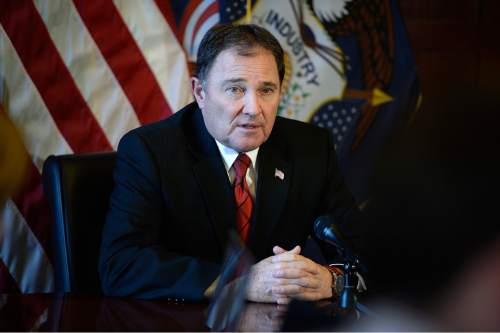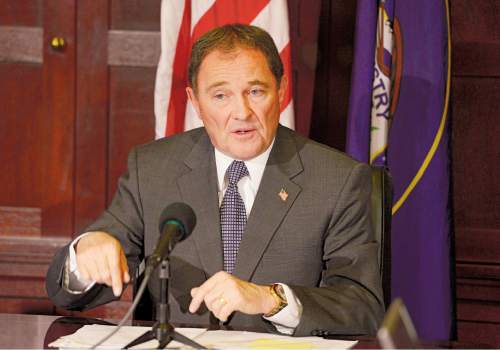This is an archived article that was published on sltrib.com in 2015, and information in the article may be outdated. It is provided only for personal research purposes and may not be reprinted.
The Legislature's push to name a portion of the Veterans Memorial Highway — Interstate 15 — after the late House Speaker Becky Lockhart hit a roadblock when Gov. Gary Herbert vetoed the measure Wednesday, after requests from veterans, their families and Lockhart's widower.
Herbert also rejected four other bills and used the line-item veto on three appropriations items, making it the biggest batch of vetoes by a Utah governor since 2004, when then-Gov. Jon Huntsman vetoed five bills and used the line-item authority on two. Lawmakers passed 538 bills in the 2015 session.
Some veterans and their families had called for Herbert to reject the highway designation measure, HB385, saying adding Lockhart's name to the 20-mile stretch of highway through Utah County would take away from the recognition meant for veterans.
Herbert said he received a call Wednesday afternoon from Stan Lockhart, the former speaker's widower, "who requested I veto the bill and I have opted to honor his wishes."
"While I am disappointed by the controversy that seemed to diminish the Legislature's recognition of Speaker Lockhart, I am committed to working with lawmakers and the Lockhart family to find an appropriate memorial to honor the memory of the historic leader," the governor said in a statement.
Lockhart died in January, just a few weeks after leaving office as the state's first female House Speaker. She was diagnosed with an extremely rare degenerative neurological disorder.
Sen. Curt Bramble, R-Provo, who was among Lockhart's closest friends and was the Senate sponsor of the unanimously approved bill co-designating the highway, said few of its critics understood that the change would have meant additional signage and recognition for the veterans.
"It's unfortunate that a bill that would have elevated the visibility of the Veterans Memorial Highway and also honored the first woman Speaker of the House, who had a significant impact on both the I-15 corridor and also on virtually every veterans bill that's been run in the last 16 years, it's unfortunate that became a point of contention," he said.
Jim Towse, the father of Cody Towse, an Army medic killed in Afghanistan, was among those who wanted Herbert to veto the bill.
"I really don't want to celebrate it at all," he said. "We were only defending the veterans' legacy more than anything else. We just didn't feel like any one name should be on the highway when it's honoring thousands of veterans."
Towse said Herbert called him Tuesday and said he wouldn't veto the bill unless the Lockhart family asked him to.
"We really didn't think that would happen," Towse said.
The governor allowed three bills to take effect without his signature, including HB368, which gives the governor a pay raise of more than $40,000 a year and gives big pay increases to the other four statewide elected officials, although it will not take effect until after the 2016 election.
"I believe it is more productive to work on bills with the Legislature during the session so the bills that come to my desk are more likely to be signed into law," Herbert said. "Overall, I am very pleased with the results of this session. Working together for the good of the people of our state is the Utah way."
Among the governor's vetoes was a controversial bill sponsored by Sen. Scott Jenkins, R-Plain City, that would have made it legal for motorists to drive through railroad crossings after gates had opened but before flashing lights had turned off.
Herbert said the change in SB249 would "endanger the safety of Utah drivers."
"Waiting at a flashing light for a few seconds may be inconvenient to some, but that small inconvenience prevents many unnecessary and devastating accidents," he said.
Herbert also vetoed a bill that would have made motion-picture companies eligible for a $2.5 million incentive to film in Utah — a sharp increase from the current $500,000 cap — arguing the return on the taxpayer investment was not as good as other uses of the money.
Bramble, who sponsored the bill, SB278, said he will be in contact with the governor's office over the coming months and expects that by next session they will agree on the proper level of incentives for motion pictures.
HB197 — which the governor also vetoed — would have allowed a local school board to request permission of the state school board to hire a candidate without an administrative license to be a school principal, vice principal, or assistant district superintendent.
The bill, sponsored by freshman Rep. Kim Coleman, R-West Jordan, would also have required the state school board to create a policy for awarding administrative licenses to individuals without a background in education.
Herbert also vetoed SB94, sponsored by Sen. Howard Stephenson, R-Draper, which proposed giving refunds on corporate-tax overpayments, because he objected to a budgeting gimmick to postpone the cost of the bill for two years and then have it apply retroactively.
Herbert allowed another education bill, SB116, to become law without his signature. Sponsored by Sen. Aaron Osmond, R-South Jordan, the bill requires school districts to provide dropout recovery services, or to contract with outside vendors to recover dropout students.
The House and Senate will poll members to see if they wish to convene to override any of the vetoes issued by the governor. If two-thirds of both bodies wish to override the bill, they will come back into session and vote to make the bill law, despite the governor's opposition.
"While we sometimes disagree with the executive branch, we respect the governor's work, and the checks and balances of our constitutional system," said Senate President Wayne Niederhauser, R-Sandy, who plans to gauge the Senate's position on an override and announce results by April 16.
Twitter: @RobertGehrke
Benjamin Wood contributed to this report





